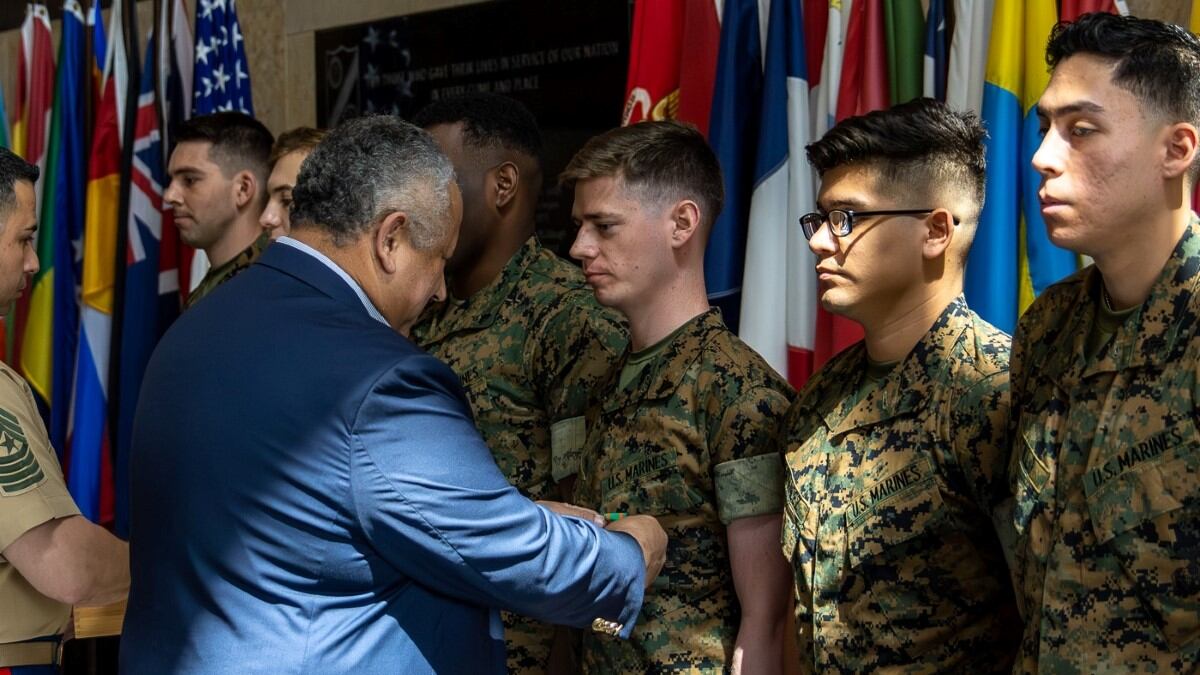The Marine security guards stationed at the American embassy in Niger will remain there as the United States evacuates all but essential staff because of a coup in the country.
The State Department on Wednesday “ordered the temporary departure of non-emergency personnel and eligible family members from Niger,” Secretary of State Antony Blinken announced that evening on X, formerly known as Twitter.
“The embassy remains open, and our leaders are diplomatically engaged at the highest levels,” Blinken said.
A State Department spokesman confirmed to Marine Corps Times Thursday morning that the Marine security guards in the capital of Niamey, Niger, “will remain there working with the Diplomatic Security Service to assist with embassy security duties consistent with those performed by Marines at embassies around the world.”
RELATED

Niger, a West African nation, is under military rule following a coup in which the democratically elected President Mohamed Bazoum was overthrown and held captive by members of his own guard.
On Friday, coup leaders named Gen. Abdourahmane Tchiani as the new head of state, while international observers called for democratic norms to be reinstalled.
France, Italy and Spain previously announced evacuations from Niger for their citizens and other European nationals, concerned that they risked becoming trapped by the coup.
In response to a Marine Corps Times inquiry on Wednesday afternoon, the State Department remained tight-lipped about how many Marines were stationed in the capital.
“As a matter of policy, we do not discuss specific security measures at our facilities,” a State Department spokesperson wrote via email, “but the Department always ensures that our posts have appropriate security resources, as determined by our security professionals, to complement the requirements of the host nation as detailed in the 1961 Vienna Convention on Diplomatic Relations.”
It’s unclear to the State Department how many U.S. citizens in total are in Niger, a spokesman said.
“Generally, that’s always a number that’s impossible for us to track,” department spokesman Matthew Miller said at a press conference Wednesday afternoon.
The United States has longstanding counterterror investments in the West African country, including a major air base in Agadez that is key to efforts against armed extremists across the Sahara and Sahel. The United States has roughly 1,000 forces in Niger and helps train some Nigerien forces.
“There are no changes to the U.S. military force posture in Niger during the Department of State-led ordered departure,” the Pentagon’s press secretary, Air Force Brig. Gen. Pat Ryder, said in a statement to reporters Thursday morning.
The State Department hasn’t requested help from the U.S. military as part of the evacuation, Ryder said.
Politico first reported Wednesday morning the news of the then-impending order to evacuate the embassy.
At the Wednesday afternoon briefing, Miller declined to confirm reports of a forthcoming evacuation order but emphasized that the State Department was committed to keeping U.S. citizens in Niger safe.
“I will say that the U.S. embassy in Niamey is open,” Miller said. “We intend for it to remain open.”
American diplomatic personnel, including the Marine security guards, had to depart another embassy in Africa’s Sahel region in April, when conflict in Sudan between warring military factions prompted the United States to send special operations troops to whisk embassy personnel out of the country.
Secretary of the Navy Carlos Del Toro in May awarded a Navy and Marine Corps Commendation Medal to the detachment commander and Navy and Marine Corps Achievement Medals to the other 11 Marines who had been stationed in the Sudanese capital of Khartoum, in recognition of their efforts to keep the embassy and its staff safe in the leadup to the evacuation.
Before evacuations, Marines may help by shredding and burning documents, and providing command and control for embassy personnel, a spokesman for the Marine Corps Embassy Security Group told Marine Corps Times after the full evacuation from Sudan.
The Associated Press contributed to this story.
Irene Loewenson is a staff reporter for Marine Corps Times. She joined Military Times as an editorial fellow in August 2022. She is a graduate of Williams College, where she was the editor-in-chief of the student newspaper.




